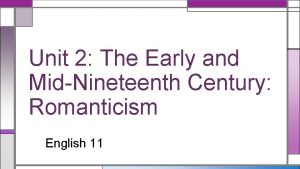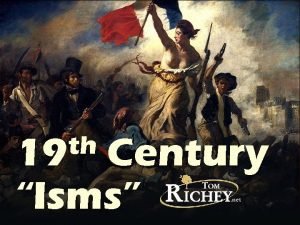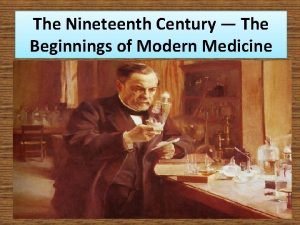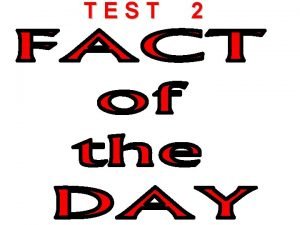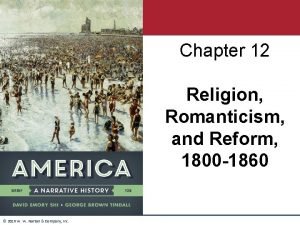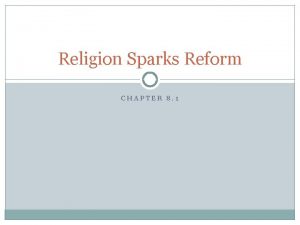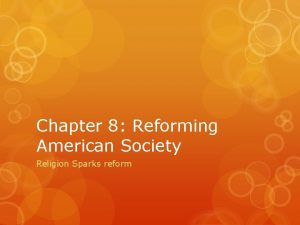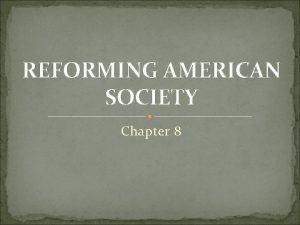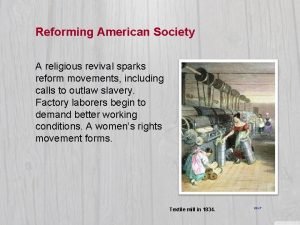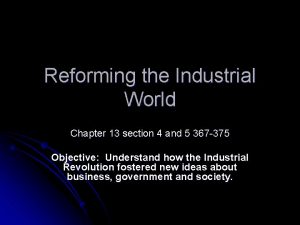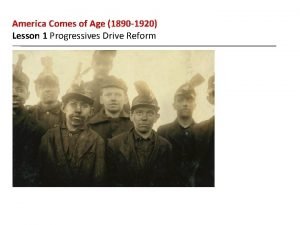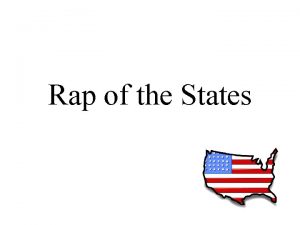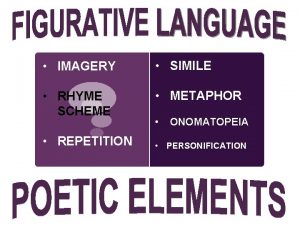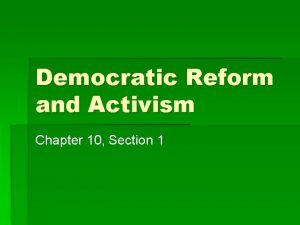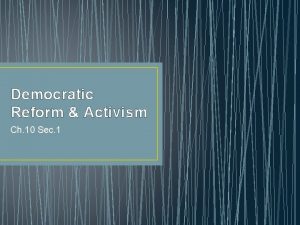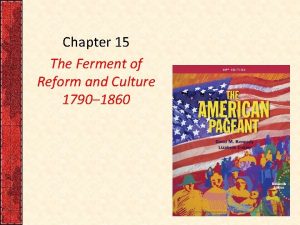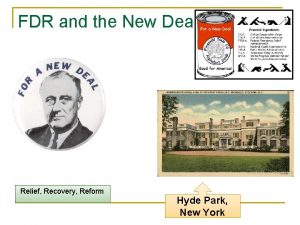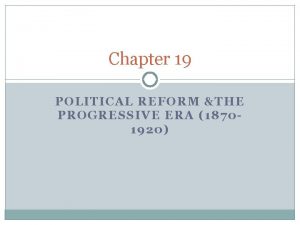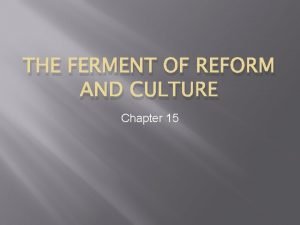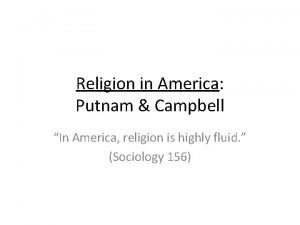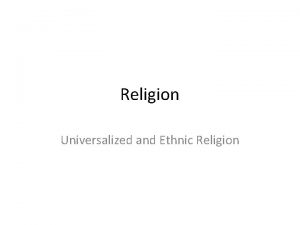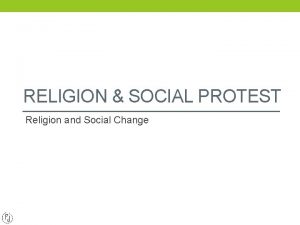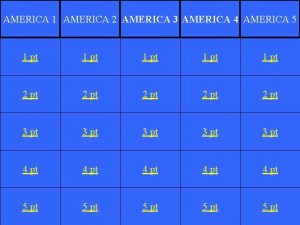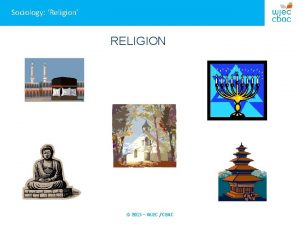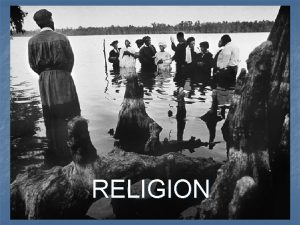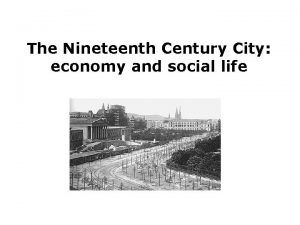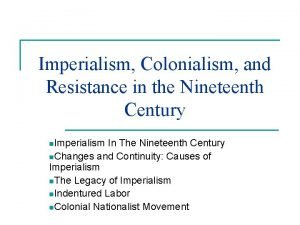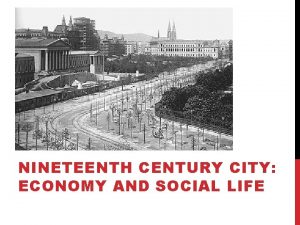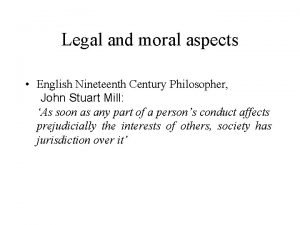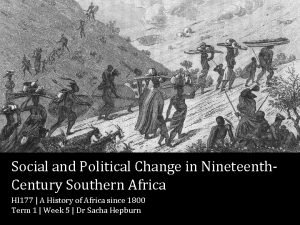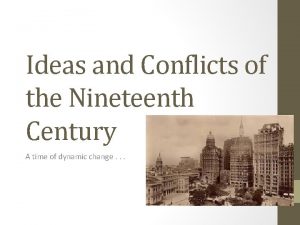Religion and Reform in Nineteenth Century America An





![Maria Weston Chapman, “What Can I Do to Abolish Slavery” It [the antislavery cause] Maria Weston Chapman, “What Can I Do to Abolish Slavery” It [the antislavery cause]](https://slidetodoc.com/presentation_image/6225c8da2f7e66500e63a0c225e069a9/image-6.jpg)






















- Slides: 28

Religion and Reform in Nineteenth Century America An Online Professional Development Seminar Abolitionists Wendell Phillips William Lloyd Garrison George Thompson

Robert Abzug Oliver H. Radkey Regents Professor of History Professor of American Studies Director of the Schusterman Center for Jewish Studies University of Texas at Austin Research Interests The formation of social and moral consciousness in American culture, social reform and religious life in antebellum America, America and the Holocaust, and the interpenetration of religion and psychology in modern American culture. America Views the Holocaust, 1933 -1945: A Brief Documentary History, 1999 Cosmos Crumbling: American Reform and the Religious Imagination, 1994 Inside the Vicious Heart: Americans and the Liberation of Nazi Concentration Camps, 1985 Passionate Liberator: Theodore Dwight Weld and the Dilemma of Reform, 1980

Religion and Reform in Nineteenth-Century America Ø What is reform in the American context? Ø How does the introduction of religion as a motivating factor transform our understanding of reform? Ø Why is one or another social, cultural, political, or economic reality highlighted as crucial to change at certain moments in history? Ø What has the role of religion been in the creation and shaping of American reform agendas? Ø How can we best analyze that role in specific ways that don't lead to unsupportable or misleading generalizations?

Key Terms Republicanism Millennialism (Millenarianism) Physiology

Maria Weston Chapman 1806 1885
![Maria Weston Chapman What Can I Do to Abolish Slavery It the antislavery cause Maria Weston Chapman, “What Can I Do to Abolish Slavery” It [the antislavery cause]](https://slidetodoc.com/presentation_image/6225c8da2f7e66500e63a0c225e069a9/image-6.jpg)
Maria Weston Chapman, “What Can I Do to Abolish Slavery” It [the antislavery cause] is “the bright consummate flower” of the Christianity of the nineteenth century. Look at those who “have not resisted the heavenly vision” it presented them of a nation overcoming its evil propensities, and doing right at all risks; ask them whether it has not saved their souls alive; ask them if it has not made them worshippers of the beauty and sublimity of high character, till they are ready to “know nothing on earth but Jesus Christ and him crucified. ” For this they give all — wealth, youth, health, strength, life. Worldly success, obtained by slackening their labors against slavery, (and it is easy to have it on those terms at any moment, so placable a monster is the world. ) strikes them like failure and disgrace. They have “scorned delights, and lived laborious days, ” till at length they feel it no sacrifice, but the highest joy. All this the American Anti Slavery Society demands of you. Do it! and be most grateful for the opportunity of fulfilling a work which is its own exceeding great reward. Do it, and find yourself the chosen of God, to keep alive in this nation, degraded and corrupted by slavery, the noble flame of Christian faith, the sentiment of honor and fidelity, the instinct of high mindedness, the sense of absolute, immutable duty, the charm of chivalrous and poetic feeling, which would make of the poorest Americans the Christian gentlemen of the world. Discussion Question What, according to Chapman, is at stake in the antislavery struggle? In addition to freedom for the slave, what is the reward for the country and for those who take part in the crusade?

Maria Weston Chapman, “What Can I Do to Abolish Slavery, ” “Imagine how the case stood with those who perished by suffocation in the Black Hole at Calcutta. Suppose that some of their number had felt the sublime impulse to place their bodies in the door, and the high devoted hearts to stand the crushing till dawn awoke the tyrant; the rest of that doomed band might have passed out alive. This is what the American Anti Slavery Society has been unflinchingly doing for you, and for the rest of the nation, amid torture, insult, and curses, through a long night of terror and despair. The life of the land, its precious moral sense, has been thus kept from suffocation. The free agitating air of faithful speech has saved it. The soul of the United States is not dead, thanks, under Providence, to that noble fellowship of resolute souls, to find whom the nation has been winnowed. Do your duty by them, in the name of self respect. Such companionship is an honor accorded to but few, and of that worthy few I would fain count you one. Strike, then, with them at the existence of slavery, and you will see individual slaves made free, anti slavery leaven introduced into parties and churches, instruction diffused, the products of free labor multiplied, and fugitives protected, in exact proportion to the energy of the grand onset against the civil system. ” Discussion Question What, according to Chapman, is at stake in the antislavery struggle? In addition to freedom for the slave, what is the reward for the country and for those who take part in the crusade?

John Humphrey Noyes 1811 1886

Noyes and the Community

Allan Eastlake, The Oneida Community After the lapse of another 1900 years it will be easier to understand the purpose of primal Causation in the American nation of to day, and recognising the spiritual significance of events that now appear trivial, to place in appropriate niches her prominent reformers of this period. In His own good time Christ came and sowed the seed, and many have been, and still more will be, the messengers who from time to time will supplement His work and share His experience. The truth must be presented at different epochs and in different forms that are adapted to advancing civilization and to the demands of higher developments of brain. Presentations of truth that were well calculated to impress the animal man when he was entirely under the influence of the cerebellum would now be ridiculous and puerile [simplistic], and the same principle holds at every stage of consciousness, till the appeal to the cerebrum for recognition of truth must be as different from anything that could impress the back brain as light is from darkness. Simply a token, or an image that did not rise to the dignity of “graven, " satisfied the soul of the savage, and a materialistic form of worship still satisfies many minds in nineteenth century civilisation, solely because they exercise no mind in the matter, but relegate thought on spiritual subjects to a paid priesthood. Discussion Questions What did the Oneida Community represent to the history of Christianity? To what degree did notions of evolution enter into Eastlake’s interpretation? What do “salvation from sin” and the “kingdom of Heaven” mean in the context of Noyes and the Oneida Community

Allan Eastlake, The Oneida Community Progression proceeded along the line of animal life, developing physique [bodily growth], thus providing the best and healthiest material for brain to feed upon. Under such fostering the first atom of grey matter gradually evolved, hinting at mental potentialities that are only transcended by the infinite possibilities of spiritual development. When men begin to realise their limitations in the line of mental achievements, they will be preparing suitable conditions for the recognition of nature's demand for regeneration, in other words, for the reception of Christ and of His messengers. OF THE LATTER, JOHN H. NOYES WAS THE MOST IMPORTANT AND CENTRAL. His message was “Salvation from sin” as the necessary and most logical test of regeneration. He heralded again the kingdom of heaven, that had been declared nineteen hundred years before as being then near “at hand (in the invisible world), ” to be now a present possession on earth, wherein Christ is reigning with His people in this sphere, requiring only their recognition to enable them to enter in and share with Him the joy of nature’s higher evolution upon the spiritual plane. The Oneida Community marked an important era in the evolution of the Christian Church. It was "an outward and visible sign of an in ward and spiritual grace; " an expression of the spiritual condition of each individual member. If each member realized “The kingdom of heaven within, " it can easily be seen that the consensus of their experiences constituted the kingdom of heaven that Christ predicted. The objection that the Oneida Community ceased to exist, and therefore could not have been the Christians' ideal kingdom, is not admissible, because the ideal Heaven is neither a place nor an organisation but a spiritual condition. Discussion Questions What did the Oneida Community represent to the history of Christianity? To what degree did notions of evolution enter into Eastlake’s interpretation? What do “salvation from sin” and the “kingdom of Heaven” mean in the context of Noyes and the Oneida Community?

Sarah Grimke 1792 1873

Sarah Grimke, Letters on the Equality of the Sexes As I am unable to learn from sacred writ when woman was deprived by God of her equality with man, I shall touch upon a few points in the Scriptures, which demonstrate that no supremacy was granted to man. When God destroyed the world, except Noah and his family, by the deluge, he renewed the grant formerly made to man, and again gave him dominion upon the earth, and over all the fishes of the sea; into his hands they were delivered. But was woman, bearing the image of her God, placed under the dominion of her fellow man? Never! Jehovah could not surrender his authority to govern his own immortal creatures into the hands of a being, whom he knew, and whom his whole history proved, to be unworthy of a trust so sacred and important. God could not do it, because it is a direct contravention of his law, "Thou shalt worship the Lord thy God, and him only shalt thou serve" [Mt. 4: 10]. If Jehovah had appointed man as the guardian, or teacher of woman, he would certainly have given some intimation of this surrender of his own prerogative. But so far from it, we find the commands of God invariably the same to man and woman; and not the slightest intimation is given in a single passage of the Bible, that God designed to point woman to man as her instructor. The tenor of his language always is, "Look unto ME, and be ye saved, all the ends of the earth, for I am God, and there is none else" [Isa. 45: 22]. Discussion Questions By what authority does Grimké revise what seemed to be the Biblically based Christian doctrine of sex inequality? How does she draw an analogy with the state of the slave? What does the Bible say about the sexes, in Grimké’s view?

Sarah Grimke, Letters on the Equality of the Sexes The lust of dominion was probably the first effect of the fall; and as there was no other intelligent being over whom to exercise it, woman was the first victim of this unhallowed passion. We afterwards see it exhibited by Cain in the murder of his brother, by Nimrod in his becoming a mighty hunter of men, and setting up a kingdom over which to reign. Here we see the origin of that Upas [poisonous or harmful influence] of slavery, which sprang up immediately after the fall, and has spread its pestilential branches over the whole face of the known world. All history attests that man has subjected woman to his will, used her as a means to promote his selfish gratification, to minister to his sensual pleasures, to be instrumental in promoting his comfort; but never has he desired to elevate her to that rank she was created to fill. He has done all he could do to debase and enslave her mind; and now he looks triumphantly on the ruin he has wrought, and says, the being he has thus deeply injured is his inferior. Woman has been placed by John Quincy Adams, side by side with the slave, whilst he was contending for the right side of petition. I thank him for ranking us with the oppressed; for I shall not find it difficult to show, that in all ages and countries, not even excepting enlightened republican America, woman has more or less been made a means to promote the welfare of man, without due regard to her own happiness, and the glory of God as the end of her creation. Discussion Questions By what authority does Grimké revise what seemed to be the Biblically based Christian doctrine of sex inequality? How does she draw an analogy with the state of the slave? What does the Bible say about the sexes, in Grimké’s view?

Sarah Grimke, Letters on Equality of the Sexes During the patriarchal ages, we find men and women engaged in the same employments. Abraham and Sarah both assisted in preparing the food which was to be set before three men, who visited them in the plains of Mamre [Gen. 18]; but although their occupations were similar, Sarah was not permitted to enjoy the society of the holy visitant; and as we learn from Peter, that she "obeyed Abraham, calling his Lord" [1 Peter 3: 6], we may presume he exercised dominion over her. We shall pass on now to Rebecca [Gen. 24]. In her history, we find another striking illustration of the low estimation in which woman was held. Eleazur is sent to seek a wife for Isaac. He finds Rebecca going down to the well to fill her pitcher. He accosts her; and she replies with all humility, "Drink, my lord. " How does he endeavor to gain her favor and confidence? Does he approach her as a dignified creature, whom he was about to invite to fill an important station in his master's family, as the wife of his only son? No. He offered incense to her vanity, and "he took a golden ear ring of half a shekel weight, and two bracelets for her hands of ten shekels weight of gold, " and gave them to Rebecca. Discussion Questions By what authority does Grimké revise what seemed to be the Biblically based Christian doctrine of sex inequality? How does she draw an analogy with the state of the slave? What does the Bible say about the sexes, in Grimké’s view?

William A. Alcott 1798 1859

William Andrus Alcott, Forty Years in the Wilderness On the top of a considerable eminence, in the very midst of a mountain range, one of the most delightful in all New England, only a few miles from the place of my lodging, was a tower some sixty or seventy feet high, which commanded a view of the surrounding country. I had often wished to enjoy the prospect which this tower afforded. Was there now an opportunity? I had the leisure, had I the needful strength? Could I possibly reach it? And by what means? I rested for the remainder of the day and the night following, at the foot of the eminence, in order to prepare myself for the excursion of the following morning. It was as much as I could do that night to take care of my irritable and irritated lungs. At length, however, I slept, and was refreshed. The only drawback upon my full renewal, was my usual night or rather as I ought to say morning perspiration, which was quite drenching and exhausting; though not much worse after all my fears than usual. Discussion Questions What religious narrative does Alcott seem to be reenacting? How might be interpret his interweaving of the physical and spiritual? How might we fit this narrative and the work of Alcott into an understanding of Protestantism in America?

William Andrus Alcott, Forty Years in the Wilderness God is good, I said to myself, when I saw from my chamber window the top of the hills I wished to climb, and perceived that the first rays of the morning sun were already falling upon them. By the middle of the forenoon I was at the foot of the mountain, and prepared to ascend it. After a little rest, I wound my way to the tower, and finally to its top, when I took a survey of what seemed to me like a new world. Here I renewed my declaration of independence with regard to those earthly props on which I had so long been wont [accustomed] to lean, and of dependence on God, and on his natural and moral enactments…… Twelve miles in the distance still was my father's house, now grown from a few patrimonial acres to full New England size; viz. , a hundred acres or more, and well cultivated. My wandering abroad had given me a little strength and very much courage. Why should it not? Was it not truly encouraging that while I was making a long excursion, chiefly on foot, in the heats of midsummer, my cough and hectic and night sweats should become no worse, while my muscular strength had very much increased? Discussion Questions What religious narrative does Alcott seem to be reenacting? How might be interpret his interweaving of the physical and spiritual? How might we fit this narrative and the work of Alcott into an understanding of Protestantism in America?

William Andrus Alcott, Forty Years in the Wilderness My mind's eye turned towards my father's house as a place of refuge. In a day or two I was in it; and in another day or two I was caparisoned [dressed] as a laborer, and in the field. It is true that I did not at first accomplish a great deal; but I held the implements of husbandry in my hands, and spent a certain number of hours every day in attempting to work. Some of the workmen laughed about me, and spoke of the vast benefits to be derived from having a ghost in the field with them; but I held on in spite of their jokes. I had been accustomed of old to the labor of a farm, which greatly facilitated my efforts. Discussion Questions What religious narrative does Alcott seem to be reenacting? How might be interpret his interweaving of the physical and spiritual? How might we fit this narrative and the work of Alcott into an understanding of Protestantism in America?

From Sketch of the Rev. Justin Edwards About this time, as the happy results of the introduction of the principle of total abstinence from ardent spirits in a large farming establishment, (that of S. V. S. Wilder, Esq. , at Bolton, Massachusetts, ) came to his knowledge, he encouraged the careful collection of the facts, and embodied them in the valuable tract, "The Well conducted Farm. " In January and February, 1826, after much consultation with the worthy friends around him, he united with the Rev. Dr. Woods and fourteen others, ministers and laymen, in forming, in Boston, "The American Society for the Promotion of Temperance". . . At first it proceeded noiselessly, employing no agent till the succeeding year, printing no report till December, 1829, and electing no corresponding secretary till May, 1831, when Dr. Edwards was appointed to that office. Mr. T, a respected merchant of Boston, states that when Dr. Edwards and Dr. Woods visited Boston to propose this new organization, Mr. T re plied, that "he had been laboring fifteen years to effect a temperance reformation by the moderate use; but he did not see that it did any good, and he was tired of 'the whole thing. " "But, " said the gentlemen who called on him, "we have a new idea. Our main object is, not to reform inebriates, but to induce all temperate people to continue temperate by practising total abstinence: the drunkards. . . will die, and the land be free. " "I confess, " said the merchant, "that is a new view of the subject, and worth thinking of. If you see best to call a meeting, I will attend it. " He did so, and from that meeting proceeded the American Temperance Society. To Reverend Wm. A. Hallock, Secretary, New York. "ANDOVER, February 10, 1826. Discussion Questions Does the strategy propounded by Edwards line up with your own vision of the temperance movement? Does it work on the same principle as the later Prohibition movement?

From Sketch of the Rev. Justin Edwards “My DEAR BROTHER We are at present fast hold of a project for making all people in this country, and in all other countries, temperate; or rather, a plan to induce those that are now temperate to continue so. Then, as all who are intemperate will soon be dead, the earth will be eased of an amazing evil. This, you will see at once, is a great plan, and to execute it thoroughly will require great wisdom and strength. And though we are so destitute, the Lord has enough of both. 'Of his fullness’ may we all receive. Discussion Questions Does the strategy propounded by Edwards line up with your own vision of the temperance movement? Does it work on the same principle as the later Prohibition movement?

Parallel between Intemperance and the Slave-Trade (1828) Herman Humphrey

Parallel between Intemperance and the Slave-Trade (1828) Herman Humphrey …. The bare mention of the slave trade is enough to excite indignation and horror in every breast that is not twice dead to humanity. The wretch who should be accessory to a foreign traffic in human flesh, and sinews, and torment, would be branded with eternal infamy, if not hunted as a monster from the face of civilized society. And yet, I repeat it, intemperance is worse than the slave trade — is heavier with woe, and guilt, and death — both being " laid in the balances together. " The principal ingredients of suffering and crime in the slave trade, are, the infernal ambush — the midnight attack and conflagration of peaceful villages — the massacre of helpless age and imploring infancy — the stripes, and manacles, and thousand unutterable cruelties inflicted between the place of capture and embarkation — the horrors of the middle passage — the shambles prepared for the famine stricken survivors on a foreign shore — the separation of husbands and wives, mothers and children, under the hammer and branding iron — the mortality of seasoning, amid stripes, and hunger, and malaria : — to which must be added, the dreadful accumulation of heart breaking remembrances and forebodings, incident to a state of hopeless bondage of themselves and their posterity, in a strange and hated land. And can any thing be worse? Can any guilt, or misery, or peril, surpass that of the slave-trade? Yes, I answer, intemperance in the United States is worse, is a more blighting and deadly scourge to humanity, than that traffic, all dripping with gore, which it makes every muscle shudder to think of. First; look at the comparative aggregate of misery, occasioned by the slave-trade on one hand, and intemperate drinking on the other. The result of this comparison will obviously depend upon the number of victims to each, the variety, intensity, and duration of their sufferings, bodily and mental ; together with the degree and extent to which their friends and relations are made to suffer on their ac- count. I am aware that the parallel does not admit of mathematical precision; neither does the nature of the argument require it. To begin, then, with the number of victims on both sides, as nearly as it can be ascertained. According to Mr. Clarkson, and other good authorities, not far from 100, 000 slaves have been shipped from the coast of Africa in a single year.

Parallel between Intemperance and the Slave-Trade (1828) Herman Humphrey This was the estimate for 1786; and of these, about 42, 000 were transported in British vessels. The period in question, however, was one of the most afflictive and disgraceful activity; when the English, French, Dutch, Portuguese, and Danes, seemed most eagerly to vie with each other in driving the infernal traffic. Probably, the average shipment of slaves for twenty years, immediately preceding the act of abolition by the British Parliament, may have ranged from seventy to seventy five thousand. What proportion fell to our share it is difficult, perhaps impossible, to determine. But when it is considered how many other great markets were then open, we can hardly suppose that more than 25, 000 were consigned to the United States. My own belief is, that the average did not exceed 20, 000; but, to make the case as strong as it will bear against the slave trade, let the number be raised (to 30, 000; making an aggregate of 150, 000 in five years, or 300, 000 in ten years. What a multitude of men, women, and children, to go into captivity, and wear the yoke of slavery forever! But we must follow these miserable beings a step further, and inquire for them in the bills of mortality. According to the most authentic estimates which I have been able to find, the number of deaths, during the middle passage, varies from six to fifteen per cent. In some extraordinary cases it has gone up to thirty, or even higher. But the average, taking one year with another, may be put down at ten, or twelve deaths in a hundred, before the slaves reach the great shambles, to which, like beasts of burden, they are consigned. Suppose, then, that our share in the infamous traffick cost from three to four thousand lives annually in the middle passage, and from eight to ten thousand more in the two first years of servitude. This, indeed, must have been, considering the cause of it, a most horrible mortality. But let us inquire whether at least as many thousands are not now enslaved and destroyed by a more ruthless enemy of happiness and of life. According to the recent calculations of Mr. Palfrey and others, which I believe an exact census would more than verify, thirty-six thousand new victims are yearly snared, and taken, and enslaved by strong drink. Thirty-six thousand perish by the hand of this fell destroyer, and of course it requires an equal number of fresh recruits to keep the drunkard's knell still sounding through the land. The parallel, then, as nearly as it can be ascertained, stands thus. Shipment of slaves, say in 1786, from twenty-five to thirty thousand. Brought into a worse bondage, by intemperance, in 1828, thirty-six thousand. Deaths by the slave trade, from ten to fifteen thousand — by ardent spirits, thirty-six thousand! Thus, where the slave trade opened one grave, hard drinking opens three. Again; as intemperance holds this " bad pre-eminence” over the slave trade in point of numbers, so I am persuaded it does in the aggregate of human misery, which it inflicts.

Parallel between Intemperance and the Slave-Trade (1828) Herman Humphrey Go, then, with me to that long abused constituent, where the first act of this infernal tragedy is acted over every month, and you will gain some faint idea of the atrocities, which it unfolds. In that thicket crouches a human tiger; and just beyond it you hear the joyous voices of children at their sports. The next moment he springs upon his terrified prey — nor sister nor mother shall ever see them more. On the right hand you hear the moans of the captive, as he goes bleeding to his doom; and on the left, a peaceful village flashes horror upon the face of midnight; and as you approach the scene of conflagration, you behold the sick, the aged, and the infant, either writhing in the fire where they lay peacefully down; or, attempting to escape, you see them forced back into the flames, as not worth the trouble of driving to market. … Shall I attempt to describe the horrors of the middle passage — the miseries which await these wretched beings in crossing the ocean? I have no pencil, nor colors for such a picture. But see them literally packed alive, by hundreds, in a floating and pestilential dungeon — manacled to the very bone, under a treble-ironed hatchway — tormented with thirst, and devoured by hunger — suffocated! in their own breath — chained to corpses, and maddened by despair to the rending of all their heart-strings. See mothers and young girls, and even little children, seeking refuge in the caverns of the deep, from the power of their tormentors ; and not to be diverted from their purpose by the hanging and shooting of such as have failed in similar attempts. The foregoing is a mere extract from the blood-stained records of the slave-trade. Who then will undertake to sum up the amount of human misery which is wafted by the reluctant and wailing winds upon the complaining waters, to be chained and scourged, to pine and die in the great western house of bondage? But while intemperance mixes ingredients equally bitter in the cup of trembling and woe which it fills up to the brim, it casts in others, which the slave-trade never mingled — for it fetters the immortal mind as well as the body. It not only blisters the skin, but scorches the vitals. While it scourges the flesh, it tortures the conscience. While it cripples the wretch in every limb, and boils away his blood, and ossifies its channels, and throws every nerve into a dying tremor, it also goes down into the unsounded depths of human depravity, and not only excites all the passions to fierce insurrection against God and man, but kindles a deadly civil war in the very heart of their own empire.

Parallel between Intemperance and the Slave-Trade (1828) Herman Humphrey Who can enumerate the diseases which intemperance generates in the brain, liver, stomach, lungs, bones, muscles, nerves, fluids, and whatever else is susceptible of disease, or pain, in the human system? How rudely does it shut up, one after another, all the doors of sensation; or, in the caprice of its wrath, throw them all wide open to every hateful intruder! How, with a refinement of cruelty almost peculiar to itself, does it fly in the face of its victims, and hold their quivering eye-balls in its fangs, till they abhor the light and swim in blood! Mark that carbuncled, slavering, doubtful remnant of a man, retching and picking tansy before sunrise — loathing his breakfast — getting his ear bored to the door of a dram-shop an hour after — disguised before ten — quarrelling by- dinner time, and snoring drunk before supper. See him next morning at his retching, and his tansy again and, as the day advances, becoming noisy, cross, drivelling, and intoxicated. Think of his thus dragging out months and years of torture, till the earth refuses any longer to bear such a wretch upon its surface, and then tell me, if any Barbadian slave was ever so miserable… Was ever a kidnapped African more wretched in his Atlantic dungeon ?

Parallel between Intemperance and the Slave-Trade (1828) Herman Humphrey But how much more terrible are the effects of intemperate drinking, upon the character and destiny of men, born and educated in a Christian land! If there is any evil which hardens the heart faster, or fills the mouth with a cursing and bitterness" sooner, or quickens hatred to God and man into a more rapid and frightful maturity, I know not what it is. … Look at him as he was, and as he is. Once the law of kindness dwelt upon his tongue, and the social affections had their home in his bosom. He kept the Sabbath, read his Bible, instructed his children, went regularly to the sanctuary, and was, at times, "almost persuaded to be a Christian. " But the fell destroyer came, disguised, at first, in cordials and sparkling holiday pledges, and side board hospitality. Yes, the destroyer came, and dried up the fountain that diffused gladness around him, and kindled every malignant and wrathful element of depravity into a raging conflagration, and converted his throat into an open sepulchre, and banished the Scriptures from his sight, if not from his dwelling, and estranged him from God's house, and incased his heart in adamant, and launched him upon that headlong torrent which thunders down into the bottomless abyss. " Be not deceived. Neither fornicators, nor idolaters, nor adulterers, nor drunkards, shall inherit the kingdom of God. " Fourthly; our free institutions are more endangered by the love of ardent spirits, than they ever were by the slave trade, or than they now are by the existing slavery of the south. No true and enlightened patriot can think, without deep solicitude, of the jeopardy which originated in stealing, buying and selling, and consuming, human merchandise. Even the quiet servitude of two millions of people is a sleeping volcano, within the reach of whose smothered fires nothing can be entirely safe. But how much more is to be feared from two hundred thousand veterans in the army of intemperance — not confined to any particular section or district of the United States, but quartered upon every town, and village, and settlement, in the nation! We encounter these mercenaries, in their uniform, wherever we go: and the power which they wield over the destinies of the country is tremendous. They are always found at the polls, and often stand as centinels over the ballot boxes. They choose our rulers, and are chosen themselves to govern us. They find their way not only into the inferior legislative assemblies, but into the grand council of the nation. We meet them at the bar, in the jury box, and even on the bench. They steal into the church of the living God; and, how shall it be spoken! The sacred desk itself cannot be effectually closed against them. Is religion any thing more than a name? Do our institutions rest upon the virtue and intelligence of the people? Does every thing depend upon the purity of the elective franchise? Is almost every drunkard an elector? What, then, must the end of these things be ? This question may be promptly answered without a prophet's ken. If intemperance should increase as it has done, and go on to corrupt the public morals, and set the laws at defiance, our government cannot stand. Its death warrant is only waiting for the proper signature, and may shortly be read on the fourth of July. A sober people may possibly be enslaved; but an intemperate people cannot long remain free.

Final slide. Thank You.
 The early and mid-nineteenth century romanticism
The early and mid-nineteenth century romanticism Conservatism buzzwords
Conservatism buzzwords Fiber weave patterns forensics
Fiber weave patterns forensics Nineteenth century
Nineteenth century Horace taylor, the verdict, september 25, 1899
Horace taylor, the verdict, september 25, 1899 W.w. norton
W.w. norton Religion sparks reform chapter 8
Religion sparks reform chapter 8 Religion sparks reform answers
Religion sparks reform answers Chapter 8 section 1 religion sparks reform
Chapter 8 section 1 religion sparks reform Religion sparks reform
Religion sparks reform Religion sparks reform
Religion sparks reform Reforming the industrial world chapter 9 section 4
Reforming the industrial world chapter 9 section 4 America comes of age lesson 1 progressives drive reform
America comes of age lesson 1 progressives drive reform Secneer
Secneer Rap of the map of the us
Rap of the map of the us Europe asia north america south america
Europe asia north america south america Repetition in let america be america again
Repetition in let america be america again Why called latin america
Why called latin america Eu amo a américa e a américa me ama
Eu amo a américa e a américa me ama The phrase companionable streams is a
The phrase companionable streams is a Chapter 10 section 1 democratic reform and activism
Chapter 10 section 1 democratic reform and activism Chapter 10 section 1 democratic reform and activism
Chapter 10 section 1 democratic reform and activism Chapter 23 lesson 3 nationalism unification and reform
Chapter 23 lesson 3 nationalism unification and reform The ferment of reform and culture
The ferment of reform and culture Revolution brings reform and terror
Revolution brings reform and terror Taxation and budget reform commission
Taxation and budget reform commission Fdr three rs
Fdr three rs Chapter 19 political reform and the progressive era
Chapter 19 political reform and the progressive era Chapter 15 the ferment of reform and culture
Chapter 15 the ferment of reform and culture
